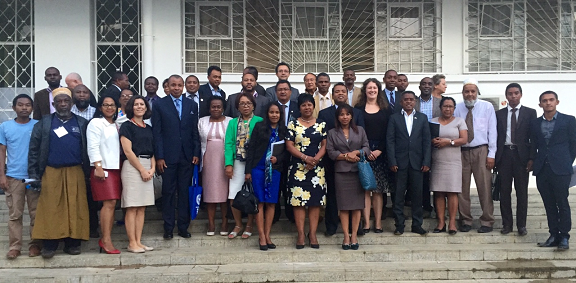Madagascar Poised to Remove Gender Discrimination from Nationality Laws
Antananarivo, Madagascar, November 5, 2015 – Madagascar, one of 27 countries that deny women the right to confer their citizenship to their children, is poised to remove this gender discrimination from its Nationality Code, a move that would ensure all citizens have equal rights to confer nationality to children and foreign spouses.
 Following a technical workshop with parliamentarians organized by the Madagascar-based NGO Focus Development, the Global Campaign for Equal Nationality Rights, Equal Rights Trust and UNHCR, more than 20 Madagascan parliamentarians signed a pledge to reform the country’s nationality code this session, bringing it into compliance with the Madagascan Constitution, which bans discrimination on the basis of sex.
Following a technical workshop with parliamentarians organized by the Madagascar-based NGO Focus Development, the Global Campaign for Equal Nationality Rights, Equal Rights Trust and UNHCR, more than 20 Madagascan parliamentarians signed a pledge to reform the country’s nationality code this session, bringing it into compliance with the Madagascan Constitution, which bans discrimination on the basis of sex.
Prior to a Nationality Assembly debate on the issue, Jean Max Rakotomamonjy, President of the National Assembly, met with representatives from the Global Campaign for Equal Nationality Rights, including the Focus Development, Women’s Refugee Commission, Equal Rights Trust and United Nations High Commissioner for Refugees (UNHCR). During the meeting, the President voiced his personal commitment to eradicate gender discrimination from the nationality law by putting forward a draft bill this parliamentary session.
Under Madagascar’s current Nationality Code, women can only confer nationality to children born out of wedlock, while Madagascan men confer nationality to their children in all circumstances. Madagascan women are also prevented from conferring their nationality to non-national spouses, a right that is reserved for men. In instances when Madagascan women apply for their children’s citizenship, the Code permits denial of nationality based on physical or mental disabilities. At the same time, racial discrimination in the application of the country’s nationality law has resulted in a significant portion of the Madagascan population having been denied citizenship, rendering this population stateless. Serious human rights abuses result from such laws, including lack of access to education, healthcare, employment, property rights and social services.
 During the November 3 parliamentary debate, representatives from Focus Development, the Global Campaign for Equal Nationality Rights, Equal Rights Trust, UNHCR, and the Office of the High Commissioner for Human Rights (OHCHR), presented the case for reform to the parliamentarians. These experts emphasized the human rights violations caused by the law, as well as the need to bring the Nationality Code in line with the Madagascan Constitution and with the country’s obligations under international law to prevent discrimination on the basis of sex, ethnicity, race, religion and disability.
During the November 3 parliamentary debate, representatives from Focus Development, the Global Campaign for Equal Nationality Rights, Equal Rights Trust, UNHCR, and the Office of the High Commissioner for Human Rights (OHCHR), presented the case for reform to the parliamentarians. These experts emphasized the human rights violations caused by the law, as well as the need to bring the Nationality Code in line with the Madagascan Constitution and with the country’s obligations under international law to prevent discrimination on the basis of sex, ethnicity, race, religion and disability.
Speakers also highlighted that discrimination in the law inhibits the country’s development, by preventing segments of the population from contributing to the economy. Importantly, the current Code also contributes to corruption due to authorities’ discretion in the application of the law.
The gallery of the National Assembly was filled with individuals affected by the law, who provided moving testimonies on this discrimination affects their daily lives. One parliamentarian gave the example of his daughter’s son, who is denied citizenship simply because his daughter, married to a foreign man. An elderly man of South Asian descent, whose ancestors have been in Madagascar for six generations stated, “I might not look Malagasy, but in my heart I am Madagascan…We give food and even donate blood from our community for the Malagasy people. When they say that we’re not integrated in Malagasy society, we are not given an opportunity to integrate.”
Research conducted over the past year by the Equal Rights Trust documented serious human rights abuses resulting from the law, including lack of access to education, healthcare, employment, property rights, social services, and citizenship itself.
“I want to work, but I can’t because I don’t have a driver’s licence. It is very difficult,” said Yousef Abdallah, who would like to be a mechanic or chauffeur. “I feel frustrated,” he added. “For the immigration services, I am not Malagasy, but I was born here, I am Malagasy.”
Student Raliya Andriatsiferanarivo, whose situation is similar, told ERT her university fees were more than four times higher than those of other students because she was not considered a national.
Following government commitments, the new nationality law is expected to eliminate gender discrimination completely.
“We are overjoyed,” said Catherine Harrington, Campaign Manager for the Global Campaign for Equal Nationality Rights. “Every day that discrimination persists in the law, individuals and their families suffer. The National Assembly has the power to end discrimination in the nationality law and we stand ready to support them in this effort.”
“Removing gender discrimination from the law would be a major step towards gender equality and eradicating statelessness,” said Dimitrina Petrova, Executive Director of the Equal Rights Trust. “It would have huge benefits for many families across Madagascar. Their lives would be changed entirely.”
The week’s events were covered by national, regional and international media, resulting in further public attention to the negative impact of discriminatory nationality laws.
Keywords:
